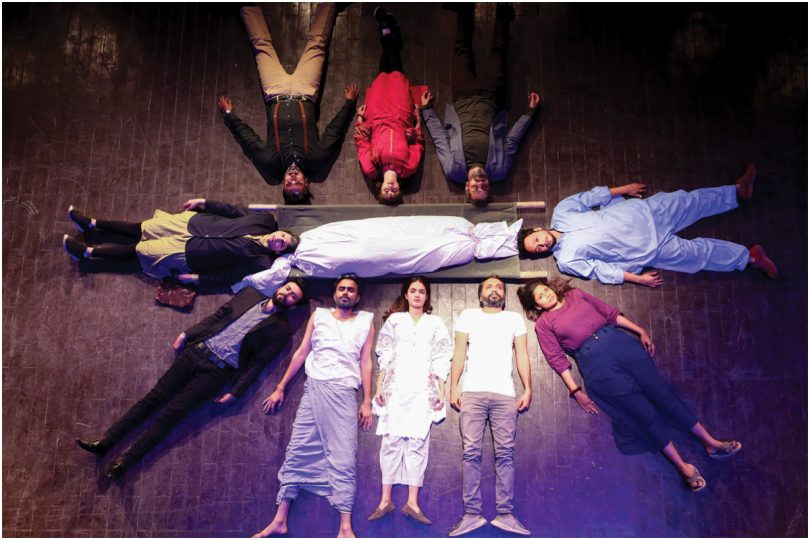Arts Council Repertory Theatre Company’s first production makes you want to lie, in a good way!
Although comedy films, dramas, and stage plays have been there for a long time, every now and then comes one play that stands above the rest because it makes you laugh uncontrollably, unconsciously, and unabashedly. It might have something to do with the society we live in, or nothing to do with it, but whatever it revolves around, the audience exits the theatre in stitches, making it a successful play like no other.
Arts Council Repertory Theatre Company’s first production 100 Din Chor Kay is one such play that makes you believe that lying is a good thing, and if done intelligently, can benefit those in need. Not only did the stage play feature senior thespians, but it also had some of the ACP students who impressed all those who watched the play during its run in Karachi earlier this month.
The Plot
Adapted from Michael Cooney’s Cash on Delivery, 100 Din Chor Kay revolves around Aamir Hasan (Fawad Khan) who after losing his job due to COVID-19, scams government-funded welfare programs, and lies to his wife, and his tenant to continue receiving benefits that are clearly not meant for him. Everything is going smoothly until Nadeem (Muhammad Ghous) from the welfare program visits to check on his alter ego Amjad Bukhari who used to be a tenant but left some time back.
Enters Irshad Painter (Nazrul Hassan) who is the current tenant and who Aamir Hasan ropes in for help, once his dual identity is about to be exposed. However, the fictional death of Irshad Sr., the arrival of Aamir’s wife, the entrance of Mamoon Bashir (Muneeb Sheikh) and Irshad’s fiancée changes everything for Aamir Hasan who finally breaks down in front of his wife. But not before Irshad is made to be Aamir Hasan in front of one person, a deaf painter in front of another, and a mourning son, all at the same time so that his friend can avoid going to jail for his crimes.

The Good
100 Din Chor Kay is about making the audience comfortable in familiar settings; it takes place in a middle-class house where the husband is jobless, the tenant is hopeless and the wife is clueless about her husband’s layoff and doesn’t have any idea how he pays the bill and stuff if he isn’t working. It takes all the might of Fawad Khan to convince everyone including his wife that he is currently employed (when he isn’t), ensure that the welfare folks don’t find out how he has been scamming them, and plead with his friend (played by Nazrul Hassan) to help him out when the going gets tough. Considering he has been around on stage, TV, and even in a few international projects (Churails and Ek Jhooti Love Story being two of them), the experience he brings onto the stage is phenomenal. He knows when the audience will clap when they will be intrigued, and when they will be bored, and uses his comic timing perfectly to cater to all those in the audience.

However, his performance wouldn’t have been as superlative as it turned out to be had there been another actor playing Irshad Painter because no one would have done it better than Nazrul Hassan. The theatre veteran who also dabbles in films and TV was phenomenal as the guy who was deaf one minute, a mourning son the next, and then a fiancé who couldn’t break his cover by talking to the woman he was getting married to in a week. It was he was the ‘man of the match’ of the drama and shared the responsibility of carrying half of the play on his shoulders, with Fawad Khan carrying the other half. The way the two collaborated on the stage reminded the audience of yesteryear comedy pairs, most notably Allan – Nannha or Rangeela – Munawwar Zarif where one was the smart alec, and the other was on the same platform as the audience so that his questions were their questions, and his suspicions were their suspicions.
The supporting cast was also exceptionally good in their limited presence, and the best part about them was that each and every one of them – be it Bashir Mamoon, Nadeem Sahab, or even Samra, the wife – gave the audience a character that would stay for them for quite some time. Not only were they relatable, but they also reminded you of someone you knew, so brilliantly they were created.

The Bad
There were a few things that could have been avoided in the play, with the acoustic setting being one of them. Sometimes the jumbled voices confused the audience so much that they might have wished that there were subtitles available, somewhere. Also, the length of the play could have been reduced by 20 to 25 minutes, since that would have made it even crisper, and even more entertaining. Also, staging it during the FIFA World Cup wasn’t a smart move because when the football world cup is on, not even Avatar: The Way of Water is able to do well in cinemas, and if you consider that, then 100 Din Chor Ke didn’t stand a chance against the tournament that went onto be defined as the best of the modern era.
The Verdict 4/5
The first thing that comes to mind once you exit the theater is that if stage folks can make comedies like 100 Din Chor Kay with fewer resources, then what is stopping the filmmakers from following in their footsteps? If writer Babar Jamal can adapt a screenplay to perfection, and director Zeeshan Haider can execute it as well as he eventually did, the more experienced and more resourceful filmmakers would have no problem doing better. Either they don’t want to break the mold of success they are all following or don’t want to take the audience in a better direction, which might help the ailing film and cinema industry in the country. Either way, they should learn from stage dramas like these which keep the stage alive and give the entertainment-deprived public exactly what they should be watching instead of what they are eventually getting in the name of entertainment.







